
by Michael | Sep 20, 2016 | Blog
When you’re preparing for a major life-cycle event, there are crucial decisions to be made. It doesn’t matter whether it’s a wedding, vow renewal, naming ceremony or even a funeral; you’re going to want to get it right.
Getting it right will depend on your choices as well as your budget. This is a mighty subject, so I propose to limit myself to weddings today.
Crucial decisions will, of course, vary from couple to couple. For some, flowers will be absolutely essential as a component of the wedding; others may see them as a desirable extra. People will normally want photographers/videographers, and these need to be chosen carefully (see my blog on this).
The most important decisions will surely revolve around the ceremony and the reception.
Ceremony
Will you have a full religious wedding in a religious building? The ceremony may well include the legal bits, which can be handy. But logistically, you’ll have to consider how you – and the guests – get from the church (or whatever) to the reception.
What if you don’t want a full religious service? Or even a part-religious one?
There are options, such as using a civil celebrant like myself. I can conduct a unique, tailor-made ceremony for a couple, with as much or as little religion or ritual etc. as they want. They will still need to have been legally married by the registrars beforehand (either at the Register Office or immediately before, at the same premises as the bespoke ceremony).
You may need to consider also how formal you want the ceremony to be, how many participants to involve (ushers, bridesmaids, Best Man/Woman etc.), the music, the decorations and so on. Do you plan to write your own vows?

Venue
Go and visit a number of possible venues, once you’ve had a look at their websites. There’s no substitute for getting a feel for the place (your gut feeling is so important here). You will also want to come equipped with a list of questions. If the event planner isn’t very helpful, does it make much sense to choose that venue?
Reception
Depending on what you want and can afford, you will have to look at who you invite and what sort of seating plan you go with. Are you having a sit-down meal or a buffet? Will there be canapés etc? When choosing a caterer, do ask to sample some of what they can offer.
Will there be gaps in the proceedings that might need an entertainer? Or a toastmaster? Will you want a disco? Might you provide a quiet area? What about children?
Have you thought about speeches?
Useful help
As you will have seen from this overview, there are many, many issues to address. A professional wedding planner will ease you through this (at a cost, of course). If you start early enough, the issues should not overwhelm you, but maybe I can offer you some welcome help?
I have written a book on this very subject: “Your Wedding Guide”. For less than £5, you can buy it on Amazon at: http://amzn.to/2e9RcqS
Alternatively, if you contact me with your e-mail address, I shall be delighted to e-mail you my free Wedding Countdown Checklist, which will suggest important tasks you need to do and time-frames for completing them.
I look forward to being of service to you!
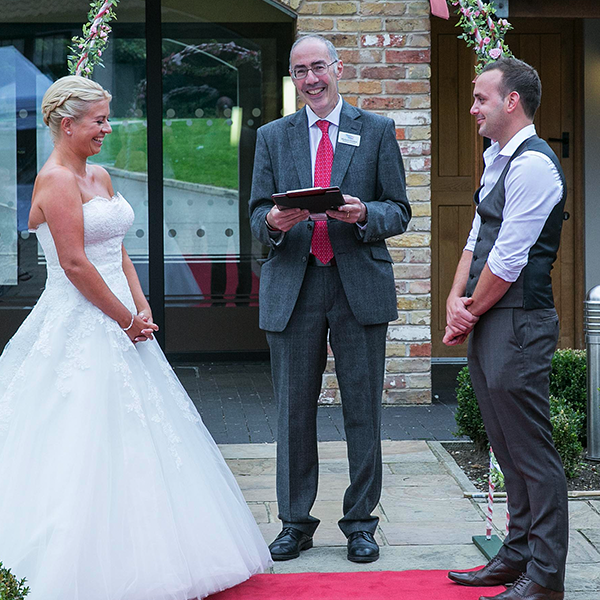
by Michael | Sep 15, 2016 | Blog
People don’t really clock what a civil celebrant can do for them. It’s inexplicable to them.
Celebrants have been practising for well over 15 years in this country. Numbers are growing. There are now a variety of umbrella organisations (like the AOIC) , who do their best to publicise and support the profession.
Nonetheless, the majority of people have no idea, or, at best, only half an idea, how we might be able to benefit them.
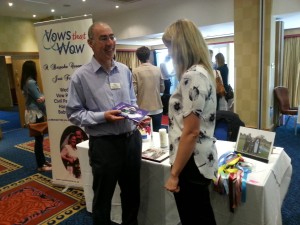
One of the best ways to spread the word is through face-to-face meetings. I regularly display at wedding fairs and even business shows. I don’t normally get any direct business, but I sow some seeds and, at least, educate people that there is a choice out there.
Better still, I show people the benefits when I get invited to conduct ceremonies. They are often amazed that my ceremony actually wasn’t as bad as they had expected. In fact, it might even have been rather good!
Another useful step is to publish testimonials from satisfied customers. This often reveals the service I can offer better than my words can! After all, the customer knows what they were expecting and wanting. They can evaluate and appreciate how it was achieved.
Here’s a brilliant example from a wedding I conducted (at quite short notice) just last week:
“Michael conducted an absolutely incredible wedding ceremony for us. I have since lost count of the number of guests who have commented on how good he was and what a fantastic service he delivered. Many asked whether he was in fact a close friend of the family, because of the warmth and delivery of the service. Ahead of the ceremony we had several Skype calls to go through everything which worked really well. He even read out a welcome in both Swedish and German, for family who’d travelled from abroad. Above all he gave us total confidence in his attention to detail and great suggestions, that he’d be conducting the service the way that we had wanted it to be. It was extremely special and personal and the way he delivered it was perfect with just the right balance of formal (we couldn’t hold back the tears) and uplifting (where everyone was laughing out loud). We couldn’t recommend him more highly.”
My belief is that, by reading something like that, you will get a better idea of how I can make your ceremony special rather than through any other method. (Do you agree?)
Be that as it may, I sincerely hope that you may be prepared to share this article and help to spread the word. A civil ceremony is not for everyone, but there are so many people who could benefit from a celebrant’s services (if only they knew they existed).
To sum up, celebrants offer true and free choice.
Maybe that’s not so inexplicable, after all!
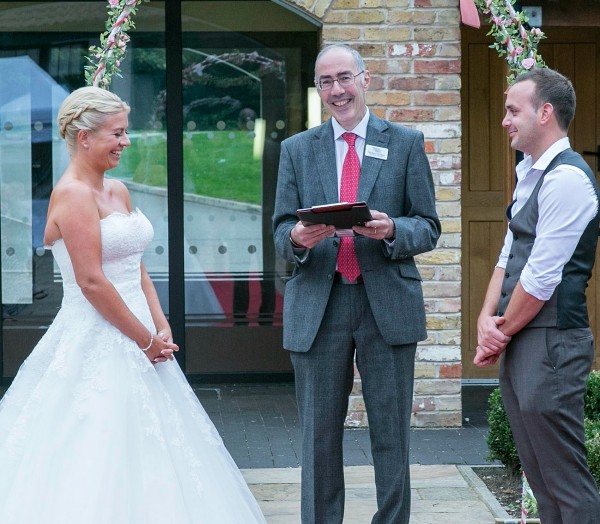
by Michael | Sep 13, 2016 | Blog
I consider myself so lucky that I am doing a job I absolutely love. (Maybe “paradise” is a wee bit strong, though!)
Bonuses
As a civil celebrant, I am privileged to be taken into the confidence of people. Obviously, these are often people I might never even have met otherwise. They talk openly to me. Sometimes I learn things close members of the family or friends don’t know. I spend time with them and work closely with many. They are often fascinating and lovely people (although no two visits are ever the same!). And, of course, I am there at the front with them on the big day, facilitating their event and supporting them.
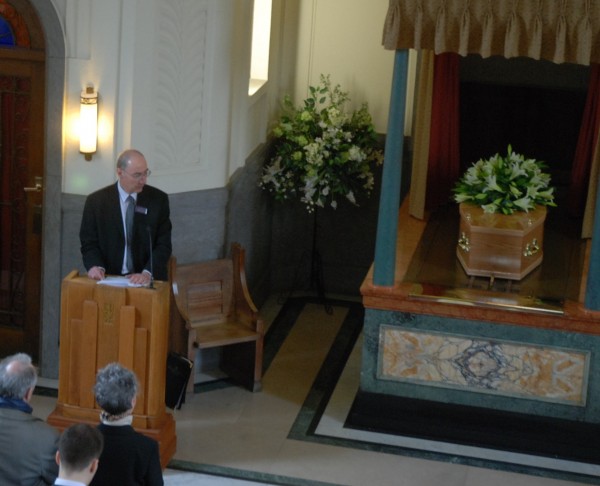
It may surprise you that I bracket funerals and weddings (and other joyful occasions) together. However, in my work there are distinct similarities between them. I may have over a year to prepare a wedding (although I have been given as little as a few weeks!) A funeral normally has about a week’s incubation time.
In both cases, I need to visit/Skype the relevant people, ask the necessary questions, listen to them and their needs, send them drafts for approval, and create the ceremony that reflects their personalities and beliefs. But the time-frame is different.
Down side
There aren’t too many things I dislike about what I do, which is wonderful. However, I have refused two possible pieces of work.
In the first case, I was invited to quote for a naturist wedding. Since I believe in being as relaxed as possible on the day, as a priority is to put my clients at their ease, I felt it unwise to pursue this. Even as a professional public speaker, I think I might have felt too self-conscious!
Secondly, I was on an introductory Skype call with a certain Ashleigh in Essex. She was very sure what she wanted for her wedding. That’s fine – I am happy to share ideas and advice, but I am not offended if people go with a different vision. However, after a while I noticed a man in the background. I wondered if he could be the groom. Indeed, he was.
“Why don’t you invite Steve to join the call?” I asked.
This is what Ashleigh replied: “He’s having nothing to do with the wedding. He’ll just turn up on the day and do what I tell him to!”
I didn’t feel that there was much of a future working with Ashleigh!
My biggest regret
I do have a couple of regrets.
I missed out on a wedding between a delightful mixed-faith couple because one parent ruled that if the celebrant wasn’t ordained (which I am not), then she would boycott the wedding. (Sorry, whose wedding was it?!)
At one of my funerals, a particularly requested hymn was not played. Why not? Because the technician popped out briefly, and totally and utterly missed his cue! It something you can’t legislate for, but I felt we had let the family down.
I’ve always fancied a destination wedding ceremony. At last, I had an offer to conduct a (re-arranged) wedding in Ibiza. Sod’s Law prevailed because it now clashed with the only holiday I had booked for our family all year. I had to say “no”.
Achievement
What am I proud of?
Bringing joy, for one thing.
I’d like to think that my website testimonials page speaks eloquently. But at several funerals, I have been pleased to be told, “I don’t know if I should be saying this, but I really enjoyed it.”
I’m proud of serving people.
On one occasion, a daughter didn’t want a funeral for her, shall we say, “difficult” father. I suggested that she should do as she felt fit. I implied that it might be worth going through with it. She wouldn’t be able to turn back the clock later, if she regretted having opposed it now. In the event, she agreed to it and was able to release much emotion. Her gratitude afterwards was very moving and also satisfying.
Oh, I do have one more regret: I only wish I had found out sooner about my path to paradise!
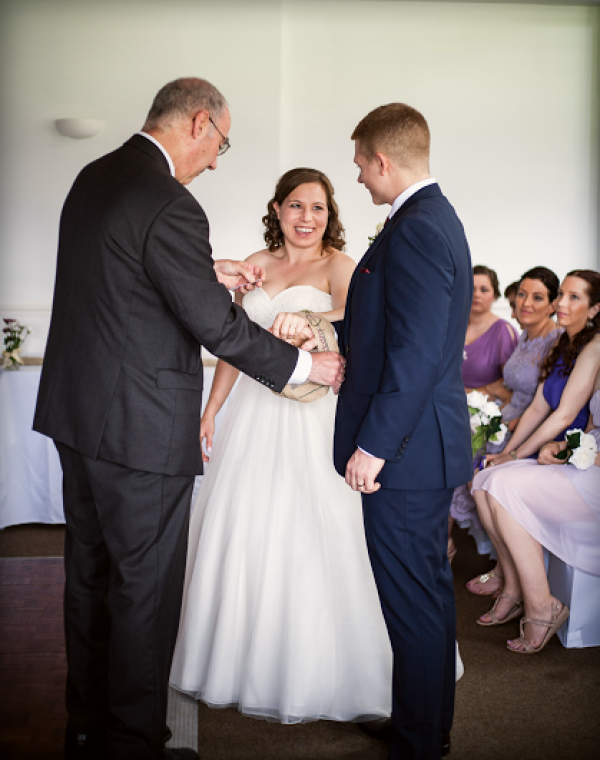
by Michael | Sep 6, 2016 | Blog
Why marry? It’s pretty easy to live with someone you love without getting wed. Marriage is all a lot of bother and expense and (depending on your viewpoint) mumbo-jumbo.
Here’s one comeback: tax and inheritance advantages of marriage. They are not to be sneezed at. However, if that’s your only motivation for marriage, then I’m not going there.
Cohabiting
There is one great reason for living together. Because you have no legal ties, there is less pressure on you both. You can make your own rules and freely agree how to deal with finances and accommodation. Indeed, the option to marry later will always exist.
If the relationship does break down, you can both walk away – maybe, easily; though not always.
It can get messy if children are involved.
Marriage
Marriage really should be a commitment. That makes it hard. By definition, committing to another person means you are promising to share what is yours (as well as what is theirs).
It means making concessions, respecting and listening to each other.
It means making your relationship a fortress – you absolutely have to ensure that you are better together than apart. You have to present a united front to all life’s challenges.
To do this, you need to understand each other and accept to differ at times, but calmly and even lovingly.
Building that ‘fortress’ should apply to couples who are cohabiting too. But without the force of the law behind them, there may be fewer incentives to achieve this.
Legalities
Having a legal binding to your relationship makes it feel harder to break out. That can be a bad thing, as some couples stay together in a toxic relationship and inadvertently damage their children.
What’s good about it is that it may encourage couples to work at their relationship. It’s all too easy to give up when sometimes all that’s needed is patience and a readiness to talk and work through the difficulties.
The Wedding
At a marriage (whether it be a regular full religious wedding, a standard register office ceremony or a bespoke civil ceremony), the couple normally are committing themselves publicly. They may repeat standard words or recite specially composed ones. Either way, they are aware of the significance of what they are promising. The fact that they are declaring this in front of (at least) their closest family and friends makes it especially significant. It gets the marriage off to a flying start.
A personal viewpoint
My wife and I lived together for a couple of years before marrying. Had that not been a success, we would not have proceeded. Going through with the ceremony underlined the fact that we were determined to make our relationship work.
We have had our moments, of course, but have worked through them (so far!). We’re looking ahead to our next anniversary, which will be our 18th. Maybe, had we stayed unmarried, but cohabiting, we’d have reached this position too. I can’t say.
All I know is that, apart from adoring our wedding day, we have no regrets about going down the marriage route. It may be old-fashioned, but that doesn’t invalidate it. We certainly recommend it to others.
Yes, it takes hard work, but the rewards are priceless.
Cover picture source: http://leerushby.com
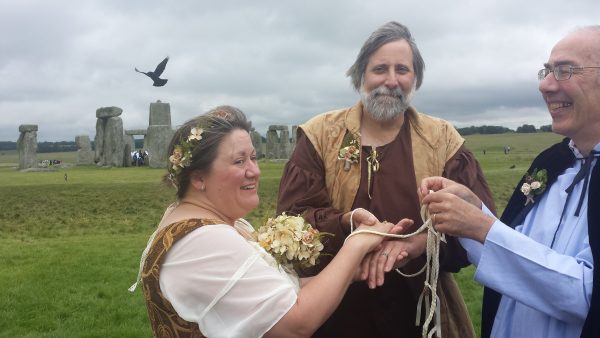
by Michael | Aug 23, 2016 | Blog
One of the many things that attracted me to the role of civil celebrant was the fact that I could offer wedding freedoms.
I could educate people that they had a choice. After all, we’re talking about what should be the biggest day of their lives.
The old way
Up until 2009, I assumed that marriage meant you either attended a full religious service, as in a church, or the register office (fully secular).
Of course, lifestyles have changed and society has become more accepting. For example, same-sex weddings have become quite commonplace. One of the favourite ceremonies I have conducted, as it happens, was same-sex.
Nonetheless, as I constantly realise from personal experience, many people are unaware that wedding freedoms exist.
Sure, the old choices are still feasible for those who want them.
The new
However, you may be a devoted couple who may not share spiritual beliefs. Happily, you can now have a romantic ceremony that includes what really matters to you. All of us have the freedom to commit to each other, surrounded by family and friends, in venues of our choice. We can invite our chosen civil celebrant to design and conduct beautiful, meaningful ceremonies.
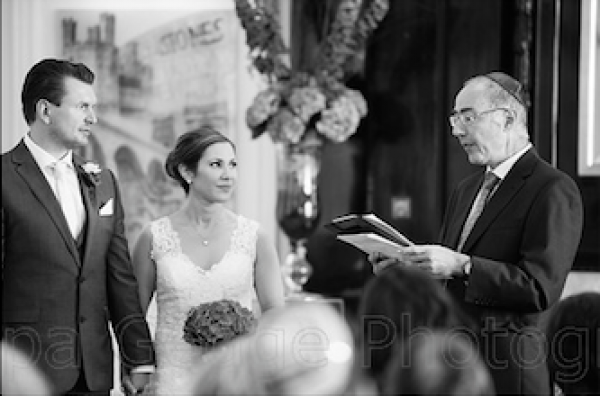
Photo: Philippa Gedge
I seem to be asked to help create a lot of part-religious ceremonies. Among them, I have led a full (well, 95%!) Jewish wedding, a wedding blessing for a Muslim and a Jewess, a Christian marrying a Jew (with a priest covering the Christian parts!) and a half-Jew marrying a pagan.
In this way, as long as the legal bits are dealt with by the registrars first, the exact degree of religiosity, of formality and tone are up to the couple. They can thus put their seal on the proceedings and make it an absolutely unique occasion.
The tailor-made service and the personalised style and special venue all contribute to a unforgettable, wonderful occasion – a far cry, for some, from the extremes of a full religious service or the register office.
I’m glad to say that we’ve come a long way from the rigidity of the past. Then you were offered only a standard 10 minute register office ceremony or a fixed, religious ceremony that was not unique to you and may have included words you were not comfortable with.
Those still work for people. But certainly not for everyone.
I believe that wedding freedoms surely make perfect sense, don’t they?
If you agree, please help me spread the word!
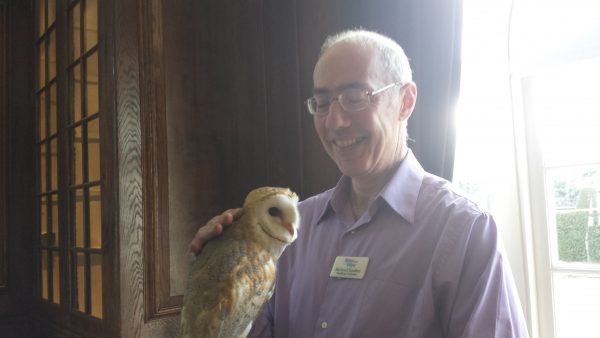
by Michael | Aug 16, 2016 | Blog
I actually heard this question on Sunday, just before the start of a wedding I conducted. It was said with a smile, but there was a half-serious undertone! But no, let me assure you at once that no one there was planning to marry a dog!
The bride, Cathy (not real name), normally highly punctual, was late – already 15 minutes late. We knew there were road closures in the area, but nobody had any idea of her whereabouts. Somebody (not terribly tactfully, I thought!) suggested that Cathy might be going to leave James (also, not real name) at the metaphorical altar.
The next thing was that James’ dog, Blue (real name!) sprinted up and made a huge fuss of James. Lots of love and affection evident there …. Hence the question that I began with!
The end of the story? Well, a few minutes later, with no fanfare or warning, Cathy arrived. (Just as I had left my post to fetch the nervous groom some water!) I’m pleased to say that, despite tears of emotion (from the bride, not me!), the rest of the proceedings went really successfully!
Incidentally, Blue had originally been intended to participate as ring-bearer, but his appetite was such that it was considered unwise to entrust this role to him. He still managed to steal the show!
I have never conducted a wedding in which fauna were involved. I have stroked a barn owl trained to deliver rings, as Blue nearly was, and I have seen pictures of releases of doves. I have no problem with these (provided no cruelty to the creatures is involved), although I guess that the risk of something going wrong is quite high!

Actors are surely right to say: never work with animals or children!
Venue
What I do like, though, is the fact that people have the choice to personalise their wedding (or ceremony) in whatever way they wish. It doesn’t have to include animals or birds, of course. The choice of venue may individualise the ceremony sufficiently. The venue could be the sea shore or a mountain top, a canalside or up the London Eye. Your back garden. A plush hotel. The list is as extensive as your imagination.
Rituals
There are some lovely rituals you can include that will make your wedding really stand out. A handfasting is just one example. Other possibilities include Unity Candles, a Sand Ceremony, the Loving Cup, Jumping the Broom, and more. Your civil celebrant can explain these or suggest others.
Personalising the ceremony
Other ways of ensuring a tailor-made ceremony might encompass the choice of music and also readings; including the couple’s “story”; using selected participants (such as Blue!). Or even including something unusual (as we did on Sunday). Mid-ceremony, after the couple had drunk from the Loving Cup, everybody was served some drink (remarkably efficiently) and then rose to drink a toast to Cathy and James, which went down a treat.
So there are many features you can incorporate or amend to make your big day really stand out. If you need ideas, your celebrant should be able to help you, but the important thing is to do what YOU want to do!










